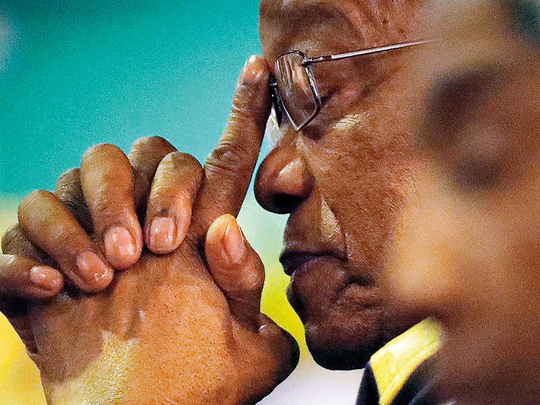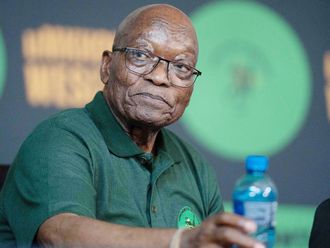
Pretoria: South African political parties, former presidents and civil society have welcomed the reinstatement of corruption charges against former President Jacob Zuma.
The country’s National Prosecuting Authority (NPA) on Friday announced that Zuma will be charged for corruption, racketeering and money laundering which were dropped in 2009, Xinhua news agency reported.
Former President Frederik de Klerk welcomed the reinstatement of the charges against Zuma.
De Klerk said there is a lot of public interest in the case and called for NPA to prosecute without fear or favour.
“While the successful prosecution of highly-connected political figures will go some way towards assuaging the angst-ridden South African public, it is still not enough to fully restore confidence in this vital institution,” said the FW de Klerk Foundation in a statement.
- FW de Klerk Foundation
“More than that, the NPA needs to make good on its word concerning the investigations into State Capture. Perhaps that will be the catalyst for the NPA towards reclaiming their constitutionally-appointed role as an institution that upholds justice and the Rule of Law,” the statement said.
The Opposition political party, Democratic Alliance (DA) applied to the courts for the charges against Zuma to be reinstated.
The DA welcomed the charges against Zuma and said he should quickly be brought before the courts.
DA leader Mmusi Maimane said: “This is a victory for all who have fought for years for Jacob Zuma to face accountability for his crimes. That accountability starts now. Now there must be no further delay in starting the trial. The witnesses are ready, the evidence is strong, and Jacob Zuma must finally have his day in court.”
Maimane said they will instruct their lawyers to oppose any attempt by Zuma to delay the trial. DA also wants Zuma to foot the legal bills.
In the past nine years Zuma spent over $1.3 million (Dh4.77 million) in legal costs trying to block the reinstatement of the charges.
Another political party, Economic Freedom Party (EFF) also welcomed the charges against Zuma. EFF said prosecuting Zuma will send a strong warning that all are equal before the law.
Quintin Ndlozi, EFF spokesperson, said: “It is important to state that no one, even former presidents, is above the law. The principle of equality before the law means we must all be equally held accountable for the deeds deemed illegal regardless of our social and political standing.”
“The prosecution of Zuma will send a strong message to all kleptomaniacs within and outside the government that they can never loot the state and not meet the consequences thereof.”
The local affiliate of French arms company, Thales will also be prosecuted. Thales won a $217 million tender to supply South Africa with combat systems for four frigates procured by the navy.
Shaun Abrahams, South Africa’s chief prosecutor, said there were “reasonable prospects of a successful prosecution” of Zuma.
A skilled tactician, Zuma rose to the presidency despite the shadow cast by the arms deal — a multibillion dollar purchase to modernize South Africa’s military after apartheid - and other legal problems, including a trial on rape charges. He portrayed himself as a victim and tapped into his deep support among poor South Africans to become president in 2009.
Prosecutors said Zuma was informed of the decision to bring charges hours before they were announced. But he did not immediately comment.
Zuma was the leader of the party and the nation’s deputy president when the arms deal was finalized in 1999. He has used legal maneuvers and the power of the presidency to avoid prosecution for years.
He was originally indicted in 2007 on 18 charges of corruption, fraud and racketeering, including accepting bribes from a military contractor. At the time, Zuma, who has always maintained his innocence, was forced to resign as deputy president by President Thabo Mbeki. The case became entwined in a power struggle between the two men.
The arms deal, made by the government of Nelson Mandela in the mid- to late 1990s, involved the purchase of naval vessels, submarines, fighter jets and other equipment from European nations. The deal totalled 30 billion rand, or between $3 billion to $5 billion at the time.
Zuma’s supporters have long argued that accusations of corruption in the case were politically motivated and that he was singled out while other ANC officials implicated in the deal were never charged.
He successfully resurrected his bid for the presidency after the chief prosecutor dropped the charges against him in 2009, accusing his own officials of political interference.
The main opposition party, the Democratic Alliance, challenged the chief prosecutor’s decision. But Zuma successfully avoided prosecution during his presidency.
In 2016, South Africa’s High Court judged that the chief prosecutor’s decision to set aside the charges was “irrational” - a ruling that was upheld by the Supreme Court last year. Legal experts said it would have been difficult for Abrahams, who was considered close to Zuma, to not reinstate the charges against the former president.
Pierre de Vos, a constitutional scholar at the University of Cape Town, said that the corruption case against Zuma could drag on for years. Zuma could still mount legal challenges to the chief prosecutor’s decision, including eventually going to the Constitutional Court.
“It’s been the former president’s strategy to use every legal loophole to actually avoid having his case being heard in court,” de Vos said. “If he has the money for lawyers, he could stay out of court forever.”
In parliament, Ramaphosa said this week that the government has spent $1.3 million on Zuma’s defence in this case. Opposition politicians, who have argued that Zuma should be forced to pay his own legal costs in this case because it preceded his presidency, said the expenses amount to several times more.
Ramaphosa said that the government will continue to pay Zuma’s legal fees but that the former president would have to reimburse the state if he is found guilty.












